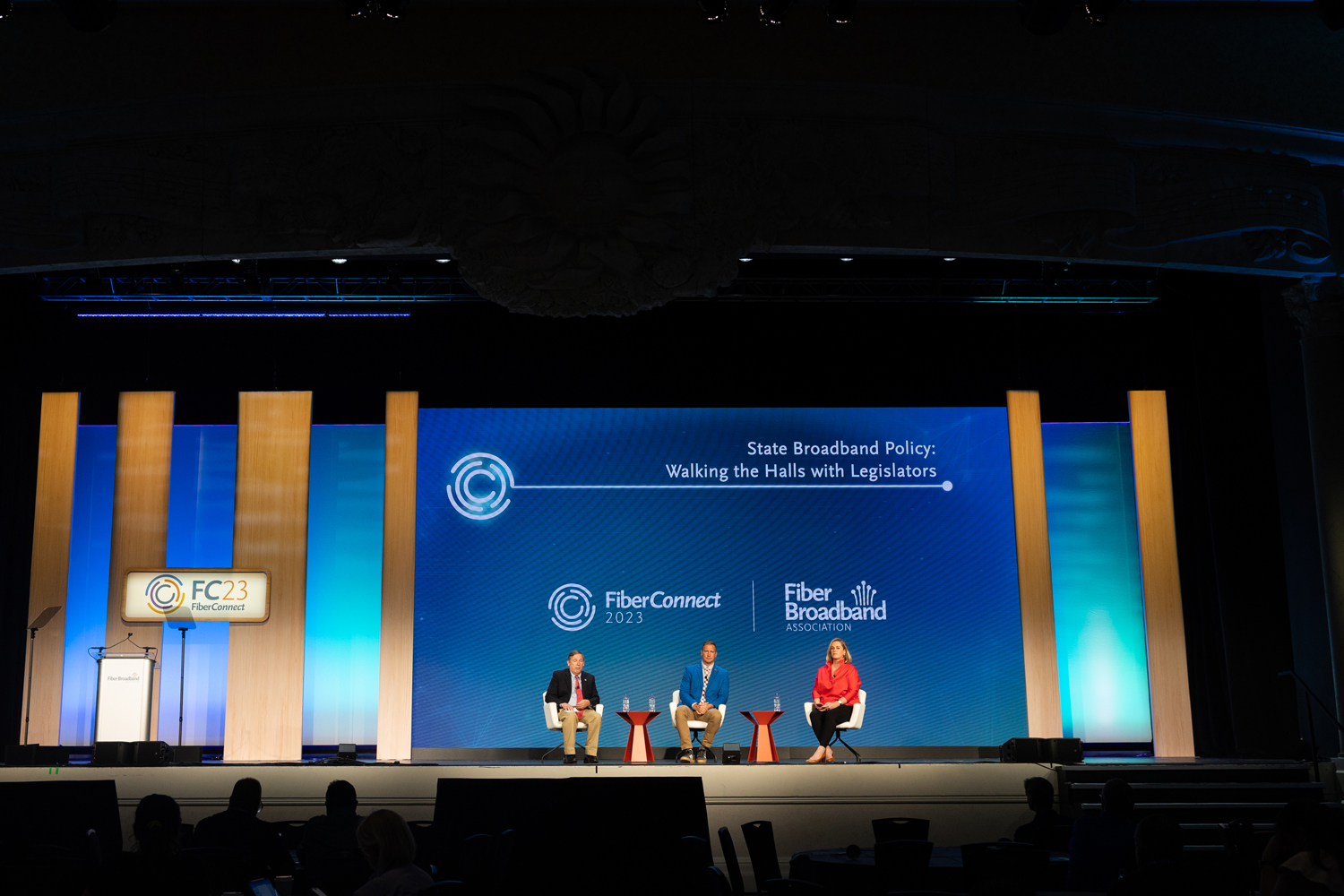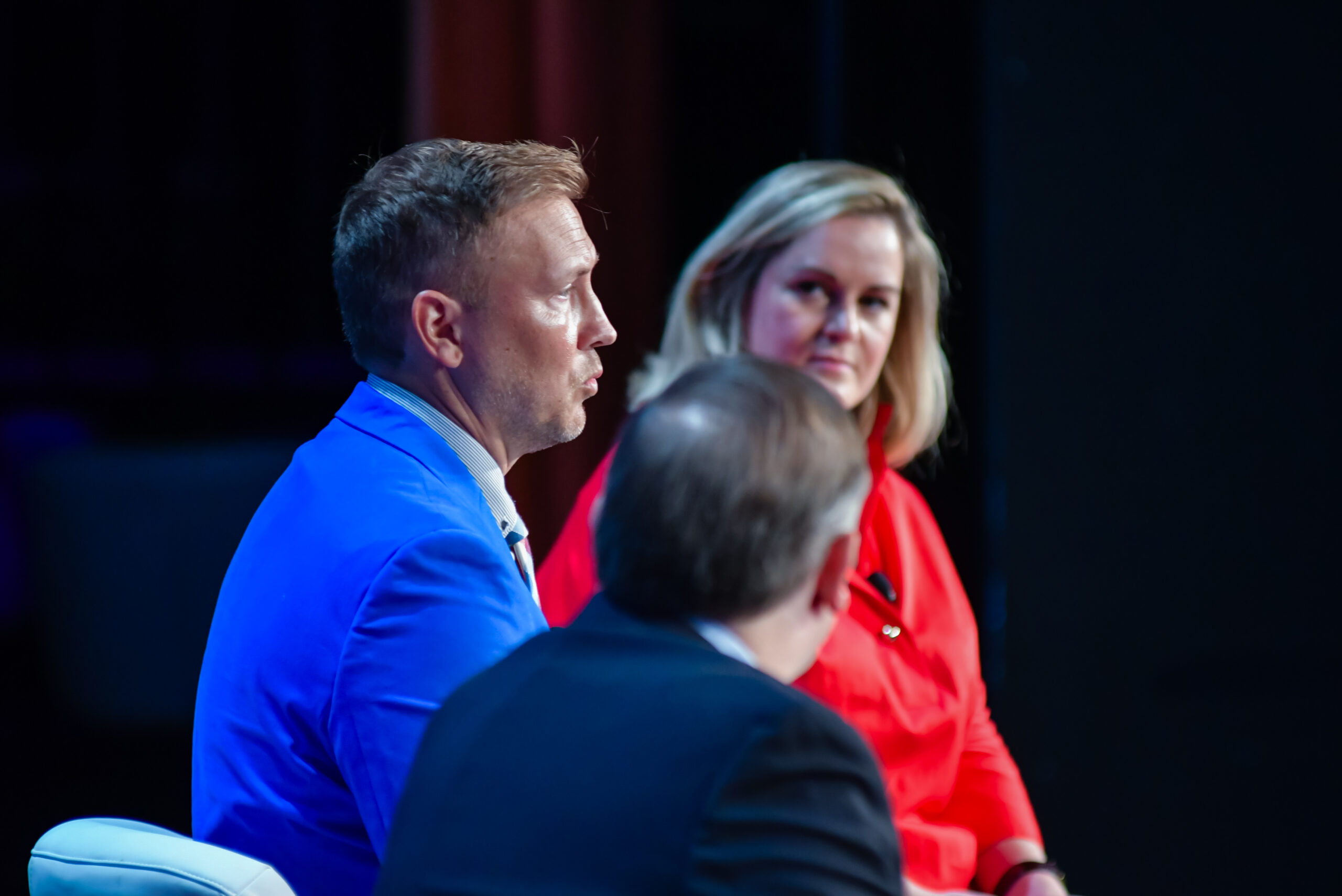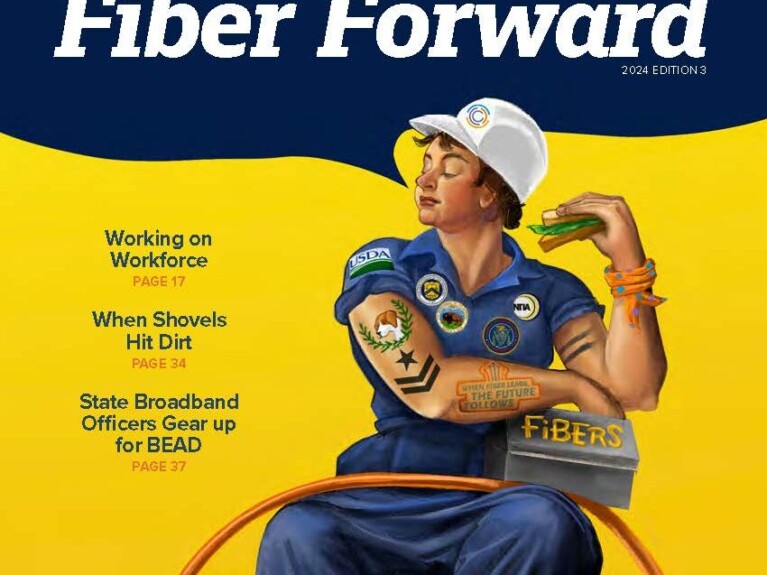Fiber Connect 2023 – Midwest Legislators Talk Broadband
Sorensen and Riggs said they ended up in broadband leadership positions without a formal background on the issue. (Source: FBA)The State Broadband Summit was among the highlights of Fiber Connect, bringing together state and federal government officials with service providers and industry leaders. Among the Wednesday sessions focusing on the rollout of BEAD funding, the “State Broadband Policy: Walking the Halls with Legislators” discussion with Representative Louis Riggs from the Missouri House of Representatives, Representative Ray Sorensen II from the Iowa House of Representatives, and moderator Katheryn de Wit of Pew Charitable Trusts provided insight into the processes and discussions going on at the state level.

Sorensen and Riggs said they ended up in broadband leadership positions without a formal background on the issue. (Source: FBA)
De Wit pointed out that both Riggs and Sorensen had run on a platform for getting everyone in their communities connected to broadband. “You have [legislators] who are working actively not just with the providers, but other members of the community, other folks who drive industry in the state,” she said, with agriculture being a prominent voice in the conversations.
“Broadband is one of the great unifiers,” said de Wit in her opening remarks. “It crosses state lines, it crosses party lines and I’m very proud to work on one of the few remaining bipartisan issues left in this country.”
“The role is pretty broad [for state legislators],” said Sorensen. “Because first and foremost, I’m not an industry expert, I’m a mural painter by training. Just bridging that education gap and making sure we know exactly what we’re talking about. [I’m] leaning heavily on my broadband office. We have a great Chief Information Officer in Iowa.
“Our role is mostly to get government out of the way when we’re in the way for connecting broadband… In a rural area, it’s so much about connecting that middle mile to the last mile. Where it doesn’t make sense for a lot of the private industry to serve Maw and Paw Jones, three miles down the gravel road, when they’re the only person they’re serving and you’re running fiber for three miles, that’s where the state comes in.”
Like Sorensen, Riggs describes himself as “self-taught” on technology and internet policy. He noted that state legislators are both policymakers and appropriators that are closer to their constituents than Congress. “We hear from them all the time,” he said. “We go back to our districts every weekend, we go into the same grocery stores, we go to the same events. ‘Where’s my internet?’ We hear that mantra a lot. I get it from all over the state because I chair a committee in that jurisdiction for broadband.”
Riggs said that broadband policy is a bi-partisan issue in Missouri, with 25% of the state’s suburbs without good internet, leading to plenty of discussion with all stakeholders. “We communicate constantly back and forth to providers, within the General Assembly, it’s not just the lobbyists, we talk to everybody,” said Riggs. “That’s been a real godsend for us. It’s basically the understanding that we’re all in this together. And the only way to solve this is all together at the same time.”
When Sorensen entered office in 2018, he was a relatively lone voice promoting broadband. “It was pre-COVID,” he said. “There wasn’t a lot of push for everybody being connected and that was what I was pushing for. One of the things I ran around saying was, ‘Let’s get everyone in Iowa connected to FCC standard broadband connection or better.’ I had that same [position] with a handful of other legislators coming in, we started a group called the Broadband Bros. We met after caucus and talked about ways that we could further engagement with the lobbyists and the governor and other stakeholders. What we could do as legislators, like I said before, to get out of the way, or to fund or to implement stuff into Iowa code AV, which is what’s set aside for all this, this code and law that focuses on broadband.”
COVID ended up changing the rules and perception of broadband for the state at large. “COVID was a blessing in this industry in the sense that it highlighted how deficient we were not only across Iowa but across the country,” said Sorensen. “It went from me begging to get $5 million in 2020 right before COVID and I was able to get $100 million in 2021. It had people calling me from all over the state, republicans, democrats, the governor, everybody was like, ‘You’ve been bringing this up forever,’ you know, and so you kind of fall backwards into becoming the IT guy. And then the Speaker of the [Iowa] House started a special IT committee specifically for this because we realized how important it is.”

Iowa House Representative Ray Sorensen, II, and Missouri House Representative Louis Riggs explore state broadband policy with Pew Charitable Trusts’ Kathryn de Wit during the State Broadband Summit. (Source: FBA)
Riggs noted he was able to work with the Missouri executive branch and having a similar lightbulb moment with the pandemic. “COVID was good for us in the sense that people understood telemedicine in ways they had never experienced before, the use of online education out of necessity,” he said. “But I go back to something with us, we really need a statewide point person on broadband. Governor Carson was from one of the most rural counties in Missouri, period. He asked what that looks like, he just sat there and shook his head a little bit and said, ‘Okay, I’ll do it.’ And that was easy.”
Within three months after that meeting, Missouri held a massive meeting with over 100 broadband providers and stakeholders. “Everybody behaved themselves, called the meeting, basically sat down and had that ‘Come-to-Jesus’ moment,” Riggs said. “We’re going to do broadband. And we look at it very simply. The only reason you shouldn’t have broadband in Missouri is if you don’t want it. And if you don’t want it, God help you, it’s time to sell the house.”
Missouri and Riggs view BEAD funding as a once-in-a-lifetime opportunity to provide broadband to all the state, requiring an “all hands-on deck approach” with constant communication between the executive and legislative branches of the state government. The Governor expanded the state broadband office from one person to a dozen, including hiring one of the people out of Riggs’ office.
The $1.7 billion allocated to Missouri, the third highest in the country, “wasn’t an accident,” stated Riggs. “We jumped through all the hoops, we were very robust in our approach. When the speaker appointed an interim committee in 2021, we’d sit down all over the state, we had subject matter hearings, issued a report, which I wrote 26 pages, in which you can actually read. Every one of those recommendations in some way, shape, or form was enacted into law in 2022. All are. We take a very measured approach and we are transparent, everybody understands the nature of the problem, and we basically put our heads together and just figured this thing out.”
Sorenson emphasized that high-speed broadband was essential for attracting jobs and people to the state. “I’m chair of economic development, too,” he said. “It’s a huge economic driver for a state to be like, ‘Come to rural Iowa, because you can work in New York City from a very affordable acreage in Iowa.”
With all the talk about technology, Riggs said the major policy factor that stood out over the last five years was the need for higher broadband speed standards. “We weren’t able to get 100/100 symmetrical,” said Riggs “We tried. Didn’t work. 100/20… They tried to put in 25/3 and to put it in statute. We’ve looked at and said, ‘Why on earth are we spending money to do bad technology?’ They’ve done that before and it didn’t end well. Having said that, we did a victory lap. Our economic development folks have been celebrating what we’re able to do with the first round of funding. Frankly, the providers who are out there doing it are our neighbors, they don’t treat us like colonists, they are not there to extract wealth, or they’re basically to go into places where people don’t go.”
Being a farming state, Iowa is also looking towards the future of agriculture and how broadband will enable it. “We look at it from the last acre standpoint, we’re finally hoping to have that conversation, we’re to that point,” said Riggs. “We know the next generation of farming [equipment] isn’t going to have cabs [for drivers]. It’s all GPS. It may be drone-enabled, it may be a [wireless] tower, we don’t know yet. You’re still working out the bugs in the software, but we know that’s our future so we need to get ahead of that.”
Affordability and sustainability for new broadband connectivity is a concern for both Riggs and Sorensen. “You’ve spent $100,000 to dig to reach these people and then they can’t afford [to connect] to what you’ve just done – it is kind of an upside-down model,” said Sorensen. “It’s pretty self-explanatory. You’ve got to make sure people are connecting the dots.”
Both representatives are looking forward to the next steps in effectively implementing BEAD funding. “With $1.7 billion on the way, we need to put every last cent to work in Missouri for Missourians, first for unserved and underserved,” said Riggs. “This is our once-in-a-generation opportunity, we get one chance to get it right.”
“I think that’s great, how they put this big box [of funds] and states are able to customize how they’re going to accept it and work with that funding,” said Sorenson. “What’s next is how are we going to spin it and roll it out, making sure your maps are accurate, making sure that all the broadband offices across the country are working in concert with the passion of telecommunications, following all the rules. The big thing for me is like Ronald Reagan said, for the government to say ‘we’re here to help’ sometimes sounds pretty scary. Making sure we get out of the way when we’re in the way and making sure that we’re solving problems.”
Each had a different request to the fiber broadband ecosystem as the panel ended. “Honestly, talk to us,” said Riggs. “The key to good advice is taking it in. The more you inform us, the more we can inform ourselves as policymakers and appropriators. The lines of communication are always open.”
“My ask is understanding the educational shortfall,” Sorensen stated. “We’re not industry nerds, so we don’t understand every single aspect of the industry. I liken it to my parents thinking I’m an industry wizard because I can turn the iPhone on and off. If I say 100/100 or 25/3 to my parents, I might as well speak Greek.”



